
P-793H v 2 Support Notes
Application-level Firewalls generally are hosts running proxy servers, which
permit no traffic directly between networks, and which perform logging and
auditing of traffic passing through them. A proxy server is an application
gateway or circuit-level gateway that runs on top of general operating system
such as UNIX or Windows NT. It hides valuable data by requiring users to
communicate with secure systems by mean of a proxy. A key drawback of this
device is performance.
Stateful Inspection Firewalls restrict access by screening data packets against
defined access rules. They make access control decisions based on IP address
and protocol. They also 'inspect' the session data to assure the integrity of the
connection and to adapt to dynamic protocols. The flexible nature of Stateful
Inspection firewalls generally provides the best speed and transparency,
however, they may lack the granular application level access control or caching
that some proxies support.
4. What kind of firewall is the P-793H v2?
1. The P-793H v2's firewall inspects packets contents and IP headers. It
is applicable to all protocols, that understands data in the packet is
intended for other layers, from network layer up to the application layer.
2. The P-793H v2's firewall performs stateful inspection. It takes into
account the state of connections it handles so that, for example, a
legitimate incoming packet can be matched with the outbound request for
that packet and allowed in. Conversely, an incoming packet
masquerading
as a response to a nonexistent outbound request can be blocked.
3. The 793H's firewall uses session filtering, i.e., smart rules, that
enhance the filtering process and control the network session rather
than control individual packets in a session.
4. The P-793H v2's firewall is fast. It uses a hashing function to search
the matched session cache instead of going through every individual
rule for a packet.
5. The P-793H v2's firewall provides email service to notify you for
routine reports and when alerts occur.
5. Why do you need a firewall when your router has packet filtering and
NAT built-in?
With the spectacular growth of the Internet and online access, companies that
do business on the Internet face greater security threats. Although packet filter
and NAT restrict access to particular computers and networks.
However, for the other companies this security may be insufficient, because
packets filters typically cannot maintain session state. Thus, for greater
security, a firewall is considered.
21
All contents copy right © 2010 Zy XEL Communications Corporation.
















































